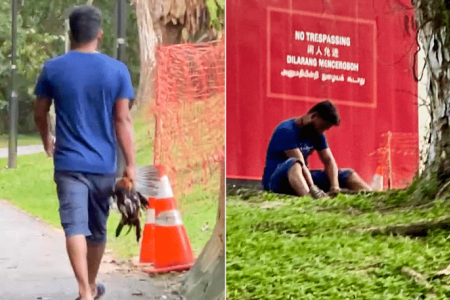NParks looking into alleged capture of wild chicken at Pasir Ris Park
The National Parks Board (NParks) is looking into the case of a man who allegedly caught a free-ranging chicken at Pasir Ris Park on Feb 17.
It is an offence under the Parks and Trees Regulations to capture or displace any animal within a public park here without the approval of the Commissioner of Parks and Recreation, said NParks group director of parks Chia Seng Jiang, in response to queries from The Straits Times.
“Carrying out any activity within any public park which one knows or ought reasonably to know may cause injury to, or the death of, any animal or any other organism within any public park is also not permitted. Offenders may be fined up to $5,000,” Mr Chia added.
Park user Joel Lee wrote on Facebook that he saw the incident on the evening of Feb 17, and posted pictures of a man holding a wild chicken. The post also claimed that the chicken was killed.
In a phone call with ST on Feb 19, Mr Lee, 64 – who is semi-retired – said he was taking a walk with his daughter in Pasir Ris Park when he saw a man in a blue shirt walking with a chicken in his hand, outside an underpass at Sungei Api Api.
“He walked up a slope near a construction site and sat behind a tree and appeared to be de-feathering the chicken,” said Mr Lee, who added that the man appeared to know he was being watched.
Mr Lee later reported what he saw to NParks and the Animal Concerns Research and Education Society (Acres).
NParks said that in the last five years, it had taken enforcement action against one individual who took wild chickens from parks.
In recent years, wild chickens and roosters have become a common sight in Singapore’s green spaces and housing estates.
In 2021, there were about 90 wild chickens in Sin Ming Court. A task force, comprising residents and animal welfare groups, acted to reduce the population to 50 in 2022. Measures included sending some chickens to farms, trimming grass to prevent the chickens from nesting, and dissuading residents from feeding the wildlife.
Mr Chia also urged members of the public not to touch birds such as free-ranging chickens, as they may be carrying several diseases.
“NParks conducts regular surveillance of birds to detect diseases... they will only pose a significant risk to human health if people come into contact with them for an extended period of time,” he added.
To reduce the risk of contracting diseases, members of the public should wash their hands thoroughly with soap and water if they come in contact with wild animals, including birds, or their waste.
“To ensure food safety, consumers are advised to purchase and consume food products, including poultry, from approved sources only,” said Mr Chia.
Acres also reported the alleged Feb 17 incident to NParks’ Animal and Veterinary Service on Feb 19.
Acres co-chief executive Anbarasi Boopal said the organisation has come across one to two reports a year about people catching wild fowl.
Ms Anbarasi added: “We have many free-roaming and wild chickens in Singapore, in parks and green spaces. It is important to raise public awareness about not feeding or catching them.
“Worryingly, this is an increasing trend, as we have even seen (other) chickens such as Silkies, Serama chickens and hybrids being found free-roaming, possibly abandoned from being kept as pets.”
Residents have also complained to town councils, objecting to culling operations that have been conducted to reduce the poultry population, said Ms Anbarasi.
Get The New Paper on your phone with the free TNP app. Download from the Apple App Store or Google Play Store now


